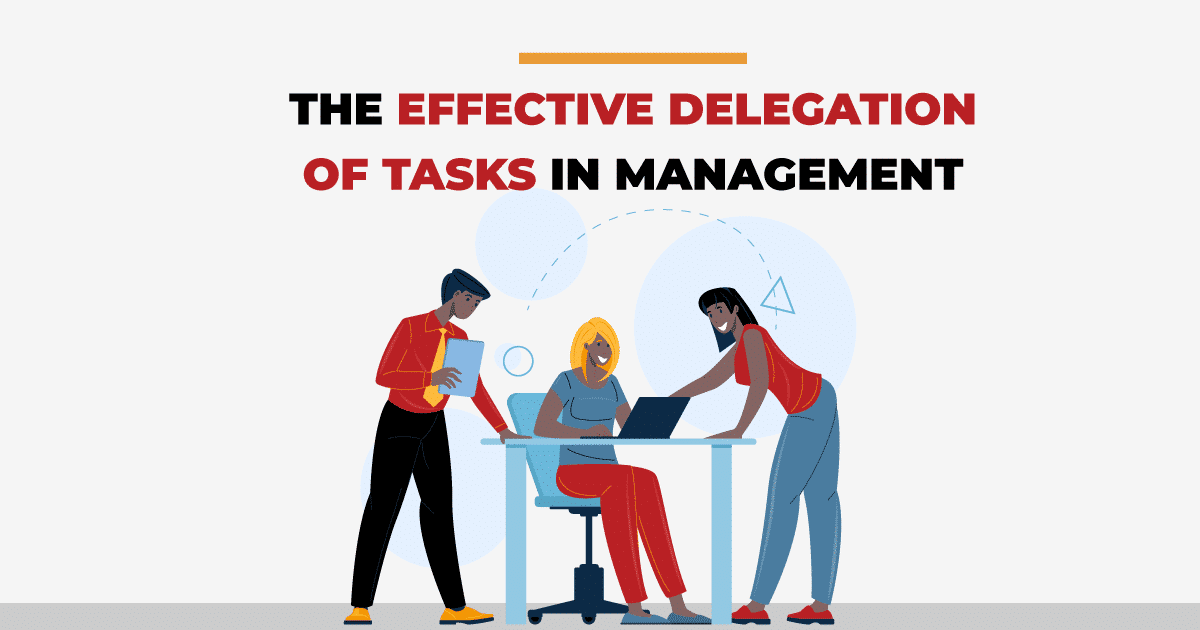How to successfully delegate tasks
Delegation is a practice that helps both the manager and the subordinate. As a manager, you should aim to be an effective leader who enhances the skills of those serving under you by giving them tasks and responsibilities that help them grow. Effective delegation also means that you are putting in place a succession plan so that in the event of your departure, there will be no leadership vacuum. At a personal level, delegation also sharpens your leadership skills.
However, delegation of work must be handled properly so that it does not result in frustrations and confusion. It must be done in a proper and structured way so that the intended results are realised.
But first, let us delve deeper into why delegation is important for people in management positions.
Table of Contents
Why delegate?

- Delegation makes the manager more effective
Through proper delegation, you are able to divide your tasks and distribute them amongst your subordinates. With more time on your hands, you can now concentrate on more critical issues. This makes you more effective and improves your output.
- Delegation creates a strong team
As you delegate your tasks more, you entrust your subordinates to deliver on the tasks even if they are slightly beyond their scope. This pushes them to work closely with you and with other colleagues, creating a cohesive team. Additionally, dividing up a huge task into tiny bits ensures that everyone involved works closely to deliver on time, which fosters more communication and collaboration.
- Shows your employees that you trust them
Delegation creates an environment of trust, where employees know that you are sure of their capabilities. This trust is important as it helps them feel valued and pushes them to expand their skills and knowledge base. It also teaches them to take initiative and work creatively. Eventually, your subordinates become motivated to go the extra mile.
- Develops your subordinates
Once in awhile, you will delegate tasks that are beyond one’s scope. In an effort to deliver on the task, this person will have to go out of their way to learn new skills, which increases their capabilities and helps them grow professionally. In the end, this person becomes more skilled and you can comfortably assign them tasks, which also frees up your time and allows you to delve into other issues important to the business.
- It improves your leadership skills
Through proper delegation of work, you learn how to grow others and lead a team more effectively. You learn how to manage a team without micro-managing what each person does, which not only saves your time but also makes you more productive.
When should you delegate?

With that said, delegation should also be done responsibly or else, it may frustrate your subordinates and make them resent their duties. In the worst cases, it demotivates them as they perceive this as your way of dodging your responsibilities and overworking them. So here are the best instances of when to delegate.
- When you do not have the time to handle all your responsibilities properly
- When a person shows willingness to help you and learn new skills
- When you realise that a person can grow their skills by taking on more responsibilities
- When a person is skilled in a particular area
- When you need to do the planning and implementation of a project, you let others implement the project while you focus on monitoring to ensure everything goes according to plan.
How to delegate effectively

As mentioned before, proper delegation must be done well so that the desired results are achieved. So, make sure you:
- Set goals
For you to ensure that you get the desired results, it is important to be clear on what you wish to achieve. Be very clear on what should be done and what the ideal outcome is. Proper goals also help you in clarifying your expectations to the person you are delegating to. Remember, do not aim for perfection as the person you are delegating to is learning, instead, you should focus on teaching the person.
- Select which tasks can be delegated
In any project, there are those things that you must handle yourself. Before delegating, be clear on what you must do yourself and what can be done by others. A clear understanding will also help you in deciding who is best placed to handle those tasks that you wish to delegate. Once this is clear, you can then choose the right person to handle the task.
- Communicate clearly on your expectations and details about the project
In order to achieve the right results, it must be clear to the person you are delegating to on what the outcome should be and what tools and resources are at their disposal. Give clear instructions and ensure that the person clearly knows what is expected. Answer all their questions and address any concerns they may have.
Effective communication is at the centre of proper delegation and you should take your time to do it smoothly. At this stage, make it clear that you are also open to questions and suggestions, and that you are ready to accord as much help as may be needed.
- Ask the person whether they have the time and dedication to do the job
Do not assume that since you are handing out duties that the person you are delegating to has the capacity and resources to get the job done. Good practice dictates that you ask about the commitment of the person to the job. This way, you also find out whether the person has the time to do the extra work you are assigning to them comfortably.
- Set realistic deadlines
Proper delegation can only work if the person expected to carry out the duties knows when the work ought to be delivered. Do not leave it up to them to decide when they are to deliver on expectations. Set clear deadlines to ensure that you are all on the same page.
- Be clear on reporting
Of course, you must ensure that you get feedback on the outcome of the project or its progress. Decide whether you want regular feedback or a final report at the completion of the task and communicate this.
The most effective approach is to encourage regular feedback so that you are able to have your input as the task progresses, rather than having to start all over again when the task has already progressed for awhile. Regular feedback also helps you to teach train the person new skills, which can be instrumental to the outcome of the project. Such a relationship helps you develop the person’s skills along the way and ensures that next time, you will give them more autonomy over the project.
In a nutshell…

Delegation is an effective process that strengthens the entire team and plays a major role in the growth of a leader. It facilitates a smooth transfer of skills, which leads to improved performance of the entire team. An effective leader delegates tasks to help grow those under them, reduce their own workload, improve their own leadership skills, create trust and foster greater team cohesiveness.
But, before you delegate, know when to delegate, who to delegate to and how to do it. It is important to always make your expectations, goal, and deadlines clear and transparent to the employees before they take on the task. And also, remember to thank the person for their help and give them constructive feedback, once they complete the project. At the end of the day, effective delegation is not about giving duties that you do not enjoy but rather, it is all about imparting skills.
Delegating Professionally: 5 Tips To Help You Along
1. Give Clear Instructions

The first reason that causes people to find delegation hard is that they do not trust those they delegate to. Most people will even claim that those tasked with doing certain things do not do them as well as expected. However, in many cases, the problem is usually in communication.
Therefore, to overcome this, you need to give clear instructions of what you want to be done. If it is something that the person you are delegating to is not experienced in, give clear instructions on how to approach that task. This will give you the peace of mind you need to let the person attend to the task without you hovering over them constantly.
2. Delegate to the Best Person Possible
Learn about the people you work with. Observe their actions and their approach to various tasks. This will give you a good idea of who to delegate to whenever you have tasks that you can’t handle. Moreover, it allows you to allocate duties and responsibilities to the right people at the right time, leading to a system of responsibility over time. At the same time, it allows you to identify your team’s strengths and weaknesses over time, which will allow you to know just how to allocate responsibilities.
3. Delegate Tasks and Authority

Most people make the mistake of only delegating tasks and leave the ability to make decisions to themselves. This makes the person doing the duty feel like they are only handymen who have no power and are likely to keep consulting you, which will eventually feel like you have done the work yourself.
To ensure that you delegate effectively, use the military strategy of giving people the autonomy to make decisions as they go, which will also allow them to be creative and take responsibility for their actions and decisions.
4. Trust those that You Delegate to
We all know that one person who gives you a task and expects you to do it just the way they would have done it. Such people have no room for creativity and are not flexible enough to let people use new tactics to get things done. They can easily stifle creativity and are often difficult to work with.
Well, if you want to delegate tasks, you have to trust those that you delegate to. Allow the person to use their own knowledge and creativity to get the job done and only give your input whenever necessary. This allows you to also see what another person can do and learn from them or learn whom to delegate what tasks to.
5. Decide What You Want to Delegate

While delegating can be nice when you are overwhelmed, it is not always something to rely on as some tasks need to be handled by you. If you have a host of tasks on your desk and are not sure how to go about them, have a look at them and categorize them in terms of urgency and importance.
Those that are not urgent but important are usually tasks that you can delegate to another person with the right competency, enabling you to focus on the urgent and important tasks. The key is to ensure that you know which tasks can be handled by another person and which ones must be handled by you personally.
Learning how to delegate can be hard, especially when you are used to doing everything by yourself. However, an important part of leadership is grooming, where you empower your subordinates to take on your roles over time. This is best done through delegation, where your subordinates get to learn gradually while you relieve yourself of some of the pressure that can weigh you down in a busy position.
Learning how to delegate helps you manage your time and resources better, while also empowering those your work with so it is in your best interest to learn how to do it well.
How do you delegate? Share with us some of the tips you use in the comments section below.





